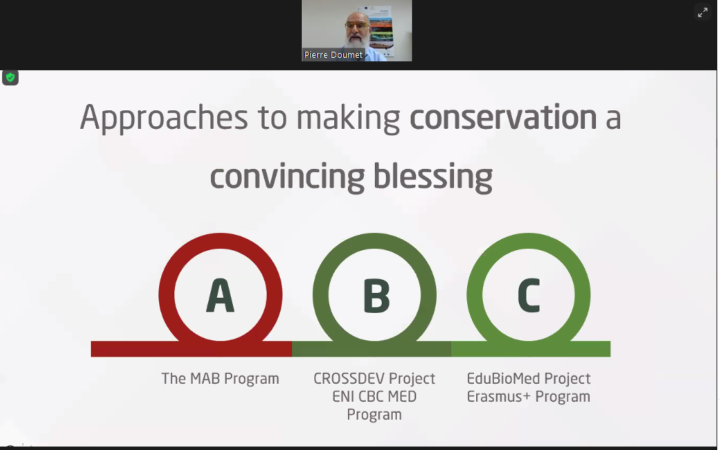
Posted on
The Biosphere Reserve of Jabal Moussa and the Biosphere Reserve of the
Arganeraie took part on May 19, 2021 in the online workshop Re-connecting Tourism with the Biosphere: a Mediterranean perspective.
The workshop organised by UNIMED in the framework of the project Sustainable Tourism (co-funded by the InterregMED programme) brought together 4 speakers and more than 40 participants coming from the Northern and Southern Shores of the Mediterranean.
As this year marks the 50th Anniversary of the UNESCO’s Man & Biosphere
Programme which stresses the importance of the sustainable connection between people and nature, particular attention was dedicated in this workshop to the development and management of sustainable tourism practices, initiatives and challenges in protected areas and in Biosphere Reserves.
Before the intervention of Mr. Doumet and Mr. AbdelAziz, in the workshop were showcased some results of two projects of the Interreg Med Sustainable Tourism Community: EMbleMatiC presented by Mr. Kostas Zapounidis and DestiMED Plus presented by Mr. Arnau Teixidor. Both the projects are developing measures towards the sustainability of the tourism in protected areas.
« There is noteworthy difference between protected area and protecting area. It is an ongoing process, in the case of Biosphere Reserve you protect live creatures, trees, animals, the people living in the reserve. It is not a monument where you can put a fence around. Protecting area means having an embracing approach » claimed Pierre Doumet, director of the Association for the Protection of Jabal Moussa, presenting the mission, the vision and the work’s approach of Jabal Moussa. He also mentioned the importance of the MAB Programme and the work Jabal Moussa carries on also participating in the ENI CBC MED project CROSSDEV which focuses on less-known tourist destinations in 4 Mediterranean regions.
Afker AbdelAziz, manager of the Biosphere Reserve of the Arganeraie, associated partner of Edu-BioMed, introduced the aims and the values of the Biosphere Reserve and among the challenges for the management of the Biosphere Reserve, he highlighted the multiplicity of actors and the divergences of their visions. Furthermore, he also stressed how a project like Edu-BioMed is important as “it works towards a research more oriented to the needs of local populations, focusing on the needs of the people living in the Biosphere connecting real life to Higher Education. Research becomes a tool for the people in the Reserve and Universities become an actor for conservation.”
A final element to the discussion was added by the UNIMED Director, Marcello Scalisi, who stressed the importance of the universities to contribute to the sustainability “Universities should work together on contributing to sustainability. Tourism is a key element in the Mediterranean Region and we should work jointly to support tourism, especially after the recent crisis, and look at it defending a different perspective.”
Here it is available the report of the event with all the presentations.



